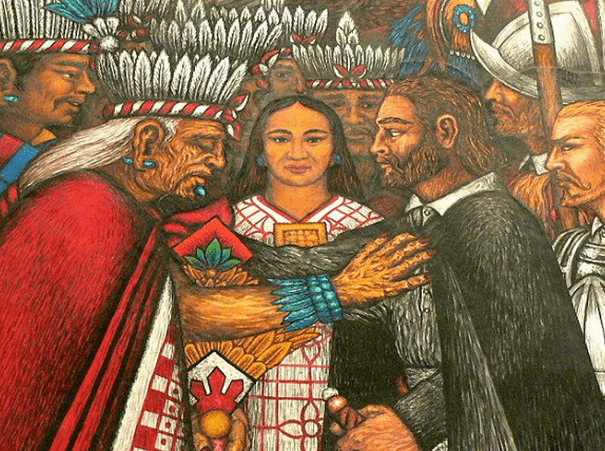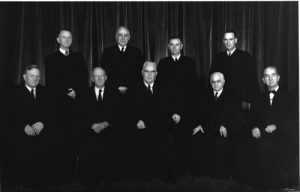Winner of the Fall 2016 StMU History Media Award for
Best Article in the Category of “People”
Best Article in the Category of “World History”
Largely due to the importation of disease and use of superior weapons, the Spaniards were able to conquer the Aztec capital of Tenochtitlan, kill the empire’s last emperor, Cuauhtémoc, and bring the Aztec empire to an end. Few know of La Malinche, the indigenous interpreter of Hernán Cortés, whose linguistic abilities were used to facilitate important conversations between the Spaniards and the indigenous leaders. Without the help of La Malinche, perhaps the Aztec empire would have survived.
Born between 1502 and 1505, La Malinche was named Malinalli Tenepal, the first part of her name being a Nahuatl term for the twelfth day of the month in correspondence to the Aztec calendar, and the second part of her name meaning “lively.” She was born of nobility in Paynala within the region of Veracruz. Her troubles started at a young age after the death of her father. La Malinche was ousted from her home to ensure her new half-brother received the inheritance of the family instead of her, since she was the eldest child. She was given to “some Indians of Xicalango.”1 Then the Indians gave her to a nobleman in Tobasco, a region in the Yucatan. When Cortés arrived to Tobasco, he was offered twenty slaves, one of them being La Malinche. Having lived in Veracruz, a Nahuatl-speaking region, and then being sold into a Maya-speaking region, La Malinche knew both languages and she was soon recognized for the linguistic talents that could benefit Cortés in his conquests.2

The few glimpses of La Malinche and how her presence as an interpreter accelerated the fall of the Aztec empire can be found in the writings of the Spanish explorers, specifically from Hernán Cortés, her “lord and master.”3 From the second letter Hernán Cortés wrote to Emperor Charles V, dated October 30, 1530, Cortés speaks of La Malinche as “a female interpreter that I had, who was a native of this country, and whom I obtained at Putunchún on the Rio Grande.”4 This confirms the vague aspects of her life that we already know. But most importantly, in this context, this letter goes on to tell of a scenario in which La Malinche saved the Spaniards from an ambush by the Cholulans. La Malinche was told by the wife of a native leader that they planned to attack the Spaniards and if La Malinche came with them, she would be protected. La Malinche delivered this message to Cortés, which ultimately led to the massacre of Cholula and provided a direct path to march towards Tenochitlan, the capital of the Aztec empire.5 This leads to the question of whether or not La Malinche was a traitor or a survivor. Did she explicitly want the Aztec empire to fall or did she just want to save herself from the carnage?
With no traces of primary sources from La Malinche herself, her story has been retold by various scholars without much consistency, nothing ever being certain. Up until the twentieth century, La Malinche was viewed as a traitor to her country Mexico. In 1861, on the celebration day of Mexico’s Independence, Ignacio “El Nigromante” Ramírez, a Mexican journalist, addressed the Mexican people by saying, “One of the mysteries of fate is that every Mexican owes his downfall and disgrace to a woman, and to another woman his salvation and glory; the myth of Eve and Mary is reproduced everywhere; we indignantly remember Cortés’s mistress and will never forget, in our gratitude to Doña María Josefa Ortiz.”6 La Malinche is seen as playing a key role in the subjugation of the Mexican peoples to Spain, while Doña María Josefa Ortiz did the contrary and liberated the country. However, many Chicana writers and modern scholars are trying to rewrite the tale of La Malinche to understand the complexities of her choices and to vindicate her. For example, Gloria Anzaldua promotes the idea that La Malinche had a “new consciousness,” that she voluntarily served as the interpreter of Cortés not only to save herself, but also because she knew that a new mestiza culture was going to be born (especially considering she had a son with Cortés in 1524).7 She made a conscious effort to exchange language and cultural aspects from each side in order to facilitate the emergence of the new mestiza society; however, with that came brutal consequences in the shape of warfare and mass death in the New World.
Whether or not La Malinche’s role as Cortés’s interpreter was traitorous, simply an effort to survive, or some other complex reason involving love for Cortés, hate for the Aztec empire for the cruelty she faced after being ousted from her home, or promotion of the new mestiza culture, no one will ever know the true story of the Indian, slave woman who traveled alongside Cortés towards the culmination of the Aztec empire.
- Bernal Castillo del Díaz, The Discovery and Conquest of Mexico, 1517-1521 rev. American ed., trans. A.P. Maudsley (New York: The Noonday Press, 1965), chap. 22-23. ↵
- Pilar Godayol, “Malintzin/ La Malinche/ Doña Marina: re-reading the myth of the treacherous translator,” Journal of Iberian and Latin American Studies 18, no. 1 (April 2012): 61-68. ↵
- Castillo del Bernal, chap 23. ↵
- Hernan Cortes to Emperor Charles V, October 30, 1520, in Letters of Despatches of Hernando Cortes, to the Emperor Charles V., trans. (New York: Wiley and Putnam, 1843), letter II. ↵
- Hernan Cortes to Emperor Charles V, October 30, 1520, in Letters of Despatches of Hernando Cortes, to the Emperor Charles V, letter II. ↵
- Rosario Pérez-Lagunes, “The Myth of La Malinche: From the Chronicles to Modern Mexican Theater” (PhD dis., Virginia Polytechnic Institute and State University, 2001), 24. Although she was of Spanish descent, Doña María Josefa Ortiz was born in Valladolid, Mexico in 1768 and identified herself as Mexican. She and her husband were both a part of the rebellion that ultimately led to Mexico’s independence from Spain in 1824. ↵
- Godayol, 68-70. ↵



230 comments
Aaron Onofre
Learning about La Malinche, makes me think about how our life experiences can lead to something much bigger than ourselves. In her case being enslaved to multiple people in different regions gave her the the ability to speak different languages. Without that experience, would Cortes have failed without her or would his attempt to take over the Aztec empire still have been successful. Those simple experiences created the person she became but the choices she made created the society that she had to live in and many others after her.
Skyla Bonilla
Before reading the article I had no idea who La Malinche was but it was interesting to find out more about this interpreter woman. The article was so well written but leaves the audience feeling anxious with questions. I personally would like to understand her intentions for doing what she did. It is an article, however, it still contains lots of drama and unanswered questions and because of that I was able to really get into it.
Matthew Gallardo
the research conducted to write this article impresses me. despite being relatively short for an article on this site, the author read up on the letters between Cortes and emperor Charles V, taking direct and first accounts as well as secondary sources to maximize how accurate the paper can be. it definitely makes up for the shortness of the article and number of sources.
Isabella De Paolo
Hi Mariana,
I loved your article, it brought back some memories for me. I was born in Playa Del Carmen, Mexico, very close Chichén Itzá. I also really enjoyed that you were able to include a painting from so long ago.
Joseph Chi
Hey Mariana, I think you did a great job at highlighting a key detail of the fall of the Aztec Empire that many people might not know of. This small act from a woman was very crucial. Congratulations by the way on the two awards of “People” and “World History”. The topic you chose to pursue was very interesting and knowledgeable and I liked how you gave her background as well instead of listing only her act of treason so that people may decide for themselves how they feel.
Jadyn Evans
I have never heard of La Malinche before, I never really heard of anyone other than the Spaniard’s side of the overtaking and destruction of the Mayans. I think that she was a bigger part of the story than people realize. I do not know if Cortes would have succeeded without her or if someone else would have helped him, but she was a part of something bigger than she ever imagined.
Aidan Fitzgerald
I had honestly never heard of La Malinche prior to reading this article yet it seems like a very important part of the fall of the Aztec empire that isn’t talked about much. La Malinche and her upbringing clearly shaped her perspective and of course being enslaved had a role as well. She was doing what she could to survive which is why I slightly lean towards her.
Travis Green
I had never heard of la malinche before but she seems like a complex person. On one hand I can understand why some would hate her because she was a big help to Hernan Cortes’s many crimes. However I find myself leaning more towards her just trying to survive. If she didn’t help Cortes she would have also been a victim of his reign of terror.
Aaron Onofre
Learning about La Malinche, makes you think about how our life experiences can lead to something much bigger than ourselves. In her case being enslaved to multiple people in different regions gave her the the ability to speak different languages. Without that experience, would Cortes have failed without her or would his attempt to take over the Aztec empire still have been successful. Those simple experiences created the person she became but the choices she made created the society that she had to live in and many others after her.
Angelo Oliva-Noeggerath
This article is deserving of the award it received as it is very detailed in the field of history and displays La Malinche around the two views people thought of her as a traitor or someone willing to continue moving to live. The article brought forward to me the existence of her as I had not heard of her before. Her position as a linguistic and being able to facilitate conversations made her important and aided towards the conquests and as a slave. Her actions of reporting to Cortes and foiling the plans of the Cholulans were what made people question whether she was a traitor or not. I personally think that being in between the proof of power the Spaniards had held compared to the natives despite the surprise attack plan would have heavily influenced her and she went for the decision that would let her live.